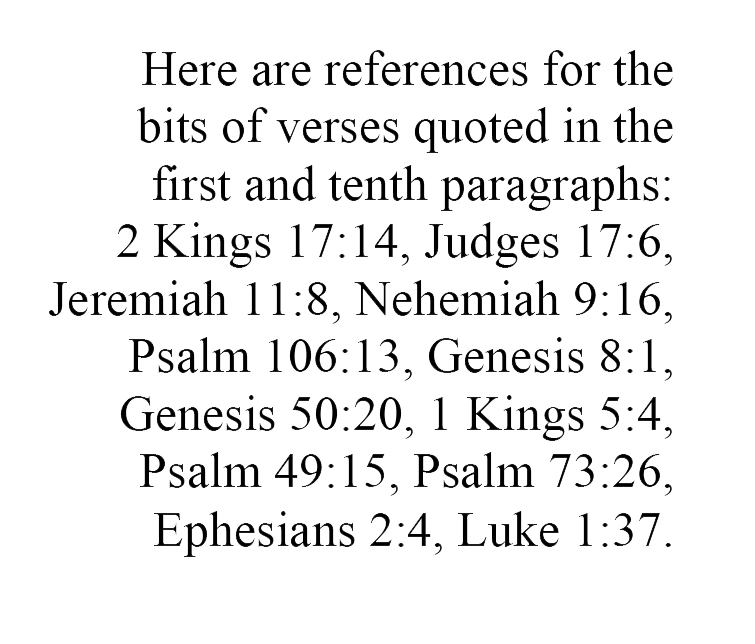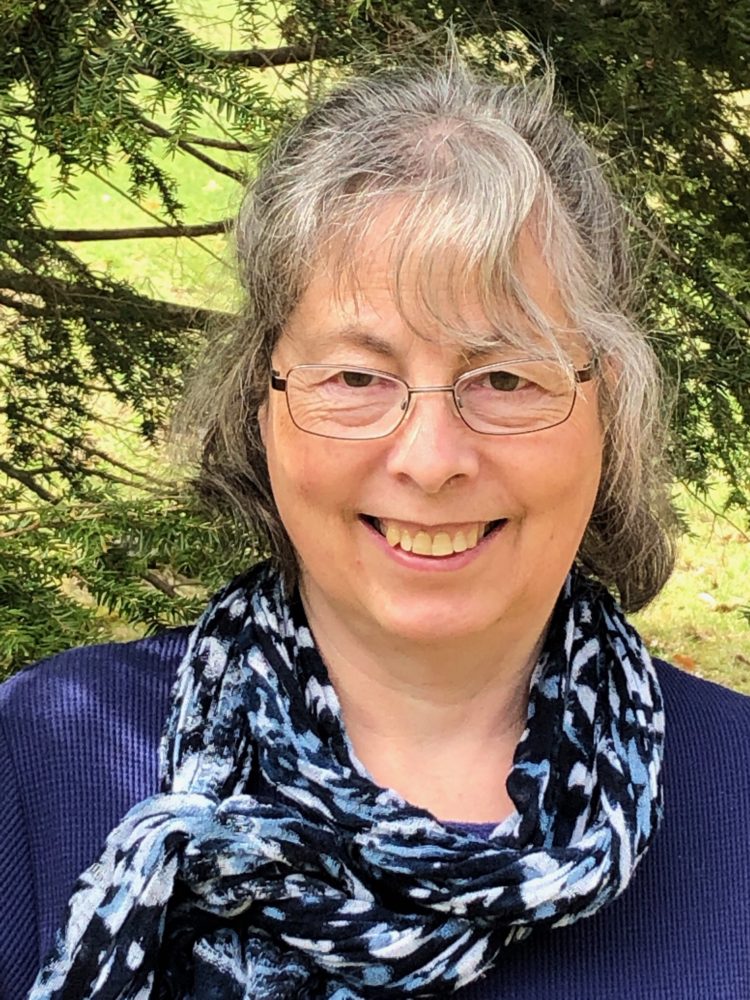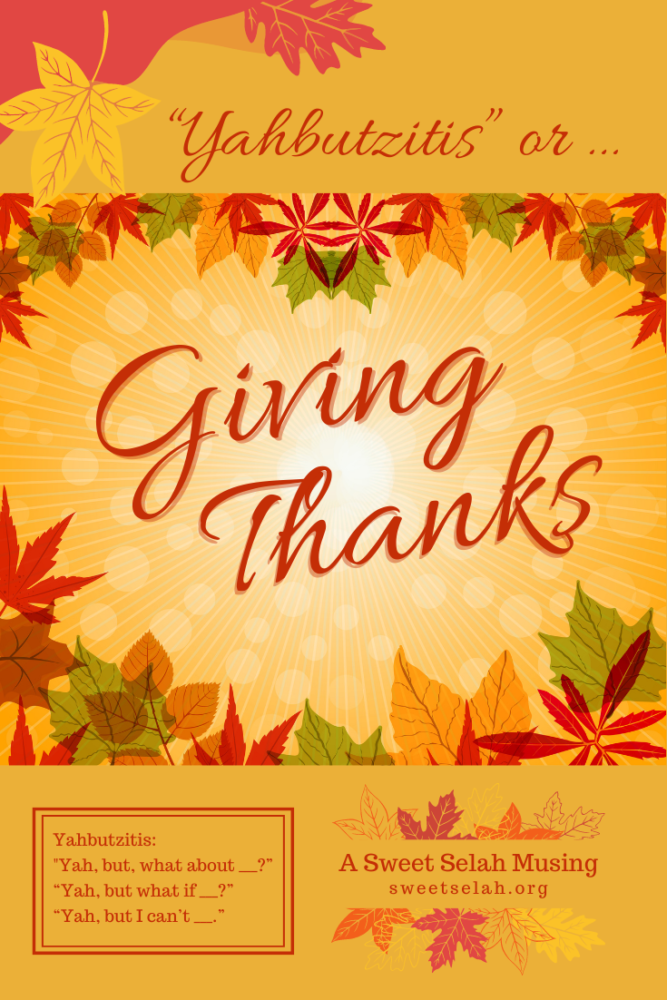 Today’s Musing is from Donna Perkins.
Today’s Musing is from Donna Perkins.
But at midnight Paul and Silas were praying and singing hymns to God, and the prisoners were listening to them. —Acts 16:25
There is a little, three-letter word in the Scriptures that is often followed by a negative reaction: “___ they would not listen,” or “___ they did what was right in their own eyes,” or “___ they would not obey” or “___ they failed to remember the miracles,” or “___ they soon forgot what God had done.”
That little word that fills in the blanks … is “But”!
Did you know this condition has a medical name? “Yahbutzitis,” more commonly known as “Yah, but, God, what about ___?” “Yah, but what if ___?” “Yah, but I can’t ___.” “Yah, but my neighbor ___?” This condition is most readily caught when we focus on our circumstances rather than on the One who writes our every moment. When we forget Him. When we’re overwhelmed with the sudden tsunami of tough stuff that comes into our lives. When we fail to remember He is with us.
If you suffer from “Yahbutzitis,” (like I often do), there is an effective treatment: giving thanks.
Take a look at Paul and Silas. They had been preaching the Gospel and performing miracles together on a long missionary journey. In the city of Philippi, Paul cast out a demon from a young slave girl, and that act translated into a financial hit to the pocketbook of the owners who controlled her. Needless to say, that did not sit well. As a result, Paul and Silas were arrested, stripped, beaten within an inch of their lives, and thrown into a suite at the “Hotel Prison Romanus.”
Their prison cell was a dark, dank room-within-a-room where prisoners couldn’t even see their hands in front of their faces. Their feet in stocks. No toilets, (I’ll let you imagine what that would look like). No perks. No comforts. Their bodies in agony after being beaten with rods. Little or no water or food. Just dark, cold, stench, and agony. Then along comes that one little, three-letter word—But. “But at midnight,” the time when everything always seems bleakest, instead of screaming out in the agony of torment or railing at the injustice, they cried out in praise and hymns to God. And that dark cell became an emblazoned cathedral of praise and worship for those prisoners. Now that’s thanksgiving!
Then along comes that one little, three-letter word—But. “But at midnight,” the time when everything always seems bleakest, instead of screaming out in the agony of torment or railing at the injustice, they cried out in praise and hymns to God. And that dark cell became an emblazoned cathedral of praise and worship for those prisoners. Now that’s thanksgiving!
How is that even possible? Because they knew that God had not forgotten them, just as He remembered and rescued Noah. Because like Joseph, they knew what men plot for evil, God can turn around into good. Because in the midst of the horrible, they experienced the peace of God that guarded their hearts and minds. Because they knew they were redeemed, and that their last breath on earth would bring the next one in Heaven. Because God was giving them supernatural strength and covering them with His mercy. Because they knew that what might seem hopeless to them was not impossible for God. Because their burden for souls far outweighed their own comfort. Because their mindset was that, yes, things may be bad … really bad … But God! Now that’s thanksgiving!
How did their thanksgiving impact those around them? The rest of the story is that an earthquake caused all the doors to swing open and all the prisoners’ chains to fall off. What a miracle that was in itself. An earthquake strong enough to shake open prison doors and loose every chain, but no one was hurt. Explain that!
God’s power was at work through the faith of Paul and Silas, causing all the other prisoners to willingly stay put when they could have escaped. The jailer, sure that all the prisoners had fled and he would be put to death, was ready to fall on his own sword when Paul stopped him and reassured him that all were well and accounted for. The result: The jailer surrendered his life to Christ, took Paul and Silas to his own home, washed and dressed their wounds, fed them, and led his own family and household to saving faith and baptism into Jesus Christ. And, “he was filled with joy” (Acts 16:34b). Now that’s how giving thanks defeats all the “buts.”
God’s version of “Yahbutz” is frequently a promise or an assurance: “But God remembered,” “But God meant it for good,” “But God has given me peace,” “But God will redeem,” “But God is the strength of my heart,” “But God, being rich in mercy,” “But with God nothing is impossible.”
So, when we have our “Yahbutz” moments and say, “Yah, but what if?” Remember, if thanks and praise turned everything around for Paul and Silas in incredibly dire circumstances, giving God our praise and gratitude can heal our lives in our circumstances right where we are today.
I know, some days I suffer from Yahbutzitis, but [smile] I think I’m going to work really hard at saying, “Yes it might be this way … but God … and be thankful!”
 Thank You God—for everything! I love You, Lord!
Thank You God—for everything! I love You, Lord!
Now thank we all our God
with heart and hands and voices,
who wondrous things hath done,
in whom his world rejoices;
who from our mothers’ arms
hath blessed us on our way
with countless gifts of love,
and still is ours today.
—Hymn by Martin Rinkart
Donna is 40+ years happily married, a thankful and proud mama and nana of three children and eight grands—and owned by one mischievous kitty, Shadow. Donna’s passions are animals, nature, “old people,” and spreading the love and encouragement of Christ through sharing His Word.

Safe in His care,
Donna Perkins
Sweet Selah Ministries
Vision
To inspire a movement away from the belief that “busy is better”
and toward the truth of God’s Word that stillness and knowing
Him matter most—and will be reflected in more effective work and service
Mission
To offer biblical resources and retreats that help women pause (Selah)
and love God more deeply as they know Him more intimately (Sweet)
Donate
If you’ve been blessed, keep the blessing going!
Click over to our Donation page … and thanks.
Share it. Pin it.



